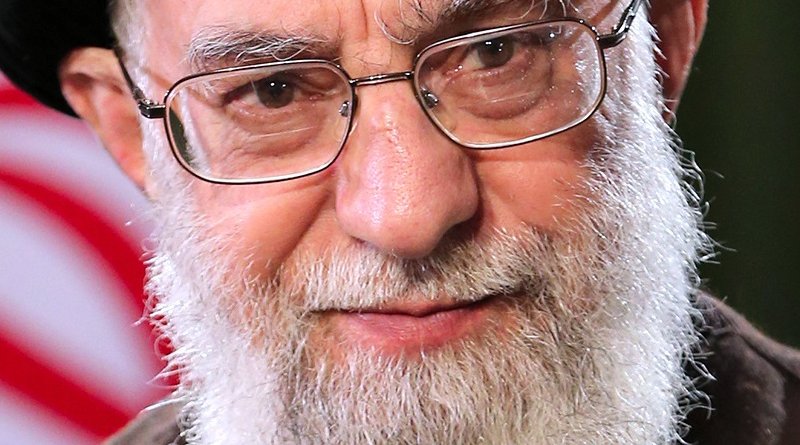White House Pressure Extended To Iran’s Foundations – Analysis
The “maximum pressure” campaign is in its next phase. Full stop.
The White House’s campaign last week went up a notch in several directions. The war of words is dying down simply because these are voices of panic who fail to understand the ongoing efforts to get Iran to capitulate on key security issues that affect the Middle East and, quite frankly, the world at large.
Importantly, US sanctions against Supreme Leader Ali Khamenei’s foundations, his office, and to “any person or entity appointed by the leader or the leader’s office” threaten action against anyone or any entity worldwide. Last week’s order covered Iran’s many religious foundations, including those administering shrines in Mashhad, Shiraz and Rey; the Setad Ejraiye Farmane Hazrate Emam (Execution of Imam Khomeini’s Orders), which controls assets valued at $95 billion; and the Mostazafan Foundation, which has nearly $1 billion in annual exports and may be the Islamic Republic’s second-biggest commercial enterprise after the National Iranian Oil Company. These foundations help to fund Iran’s militias and other nefarious activity around the region and the world.
The foundations have a wide range of assets, such as investments in agriculture, banking, insurance, manufacturing and other businesses. Some estimate that 20 to 30 percent of the Iranian economy is within or linked to foundation coffers. Any entity globally that transacts with such a foundation or individual is now subject to sanctions.
The scope of the sanctions against the foundations is important. Khamenei appoints clerical members of the Guardian Council, the legal authority of the chief justice, the head of state broadcasting and media, and senior military commanders. His representatives under this scope include the head of the Islamic Centre in London’s Maida Vale and other properties in countries throughout Europe and the world.
US Treasury Secretary Steven Mnuchin also designated eight Islamic Revolutionary Guard Corps (IRGC) commanders, including the navy’s Alireza Tangsiri, aerospace commander Amir Ali Hajizadeh and ground force commander Mohammed Pakpour. The sanctions also targeted the commanders of the IRGC Navy’s five districts — Abbas Gholamshahi, Ramezan Zirahi, Yadollah Badin, Mansour Ravankar, and Ali Ozma’i — for their role in its “malicious regional activities, including its provocative ballistic missile program, harassment and sabotage of commercial vessels in international waters and the IRGC’s destabilizing presence in Syria.” These sanctions are directly related to IRGC and proxy activity against oil tankers in and around the Strait of Hormuz. Mnuchin said that Foreign Minister Mohammad Javad Zarif is next in line for designation.
The mapping of foundation assets needs to be put into the context of the earlier designation of the IRGC as a Foreign Terrorist Organization (FTO). Together these sanctions are a double whammy for Iran. The FTO designation, when mixed with foundation activity, can open the possibility of taking more direct action against Iranian proxy networks throughout the region and the world. The ability to close down these networks helps to further strangle the Iranian leadership.
Events in Iraq also show how maximum pressure works. Iraqi Prime Minister Adel Abdul Mahdi’s decree to curb the powers of Iranian-backed militias and force them to integrate more closely with the formal armed forces is seen in the context of isolating Iran by cutting off its routes into the Levant. The militias, together known as the Popular Mobilization Units (PMU), have broad influence in Iraqi politics and are close to Iran in terms of their support networks. To be sure, the PMU already reports to the prime minister, who is the commander-in-chief of Iraq’s armed forces, but Abdul Mahdi’s decree forces the groups that make up the PMU to choose between political and paramilitary activity. The last straw for many regional powers was the PMU-supported raid of the Bahraini Embassy in Baghdad to protest the Manama conference on Palestine. Now, the PMU militias have until July 31 to abide by the new regulations.
Gulf and US pressure on Iraq is helping it to break Iran ties. The move to bring the PMU in line with the government is a critical step to isolating those militias that should be sanctioned under the scope of the IRGC FTO, including their funding, which is coming from Iranian clerical foundations. Stopping these networks is critical, given their ability to move missile components and armed drones.
But the biggest message sent to Iran was two weeks ago after Tehran lashed out at the US by shooting down an RQ-4A Global Hawk surveillance drone with a surface-to-air missile over the Strait of Hormuz. This helped the US identify the command and control of such an attack and, in response, the White House ordered a cyberattack on the IRGC’s missile control system. This strategy, developed by US Cyber Command, helps to flush out Iranian capabilities, bringing Washington’s wide arsenal of capabilities to the forefront with the appropriate countermeasures in place.
Combining targeted cyberattacks on IRGC command with ordering Iraq’s PMU groups to break their ties to Iran, while using the IRGC FTO in emerging situations, is the logical path forward and is proof the ongoing maximum pressure campaign is working.

